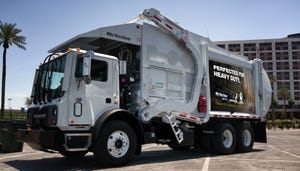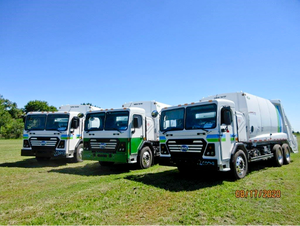Surviving the Crisis—Financial Lifelines for the Coronavirus
There are many options to help waste businesses get through this crisis.
April 7, 2020

The U.S. is experiencing a crisis like we’ve never seen before. Business are shut down. Schools are closed. The stock market has tanked. And no stores seem to have any toilet paper in stock.
Despite all of these challenges, waste haulers are still serving clients. While individuals and businesses across the U.S. struggle to remain healthy and viable, the waste industry, an “essential” service, must continue operating.
Our industry is not immune to the challenges created by this virus. We struggle to keep our employees healthy. We struggle to adapt to a workplace that requires social distancing. And we struggle to remain financially secure despite rapid declines in revenue from our various lines of business.
If your business has been impacted as a result of the coronavirus, there are a number of financial lifelines available that can help you. First, I encourage you to contact your local banker and any other creditors. Ask them what options they are offering to businesses that have been hurt as a result of the virus. You will be surprised at how willing they are to help.
In most cases, my peers in the industry are offering immediate payment deferrals on loans and mortgages. Many are offering one-month deferrals with very little required on your part. Others are offering three to six months of either deferred payments or interest-only payments. These will typically require a bit more paperwork.
In addition, the U.S. government recently passed a relief bill called the Coronavirus Aid, Relief, and Economic Security (CARES) Act that provides financing options through the U.S. Small Business Administration (SBA) that are specifically designed to help businesses get through this crisis.
One of those options is called the Paycheck Protection Program (PPP). The PPP provides up to $350 billion for loans to small businesses to help them keep workers employed during this crisis. These loans can be up to 2.5 times the average monthly payroll costs with a maximum loan size of $10 million. Some, or all, of these loan amounts may be forgiven if the borrower meets certain guidelines.
The PPP loans are available to businesses with up to 500 employees, sole proprietors, independent contractors, business owners and nonprofit organizations. If you are interested in learning more about the program and how it works, contact your local bank, credit union or the SBA directly.
As I write this article, the final rules of the program are being defined. However, the SBA has assured banks, credit unions and their other financing partners that the PPP will work quickly, efficiently and with as little burden on borrowers as possible to insure they get the help they need right away.
Between negotiating with your current lender(s) and/or pursuing options provided in the CARES Act, the majority of independent haulers will find much-needed financial lifelines that can help them successfully get through this crisis.
Bill White has worked and served the banking industry for more than 30 years. He founded a bank holding company at age 33, and later, after selling that company, become president and CEO of another financial institution. White and his family have served the waste and environmental industries for many years. They started Estes Waste Solutions in Jeffersonville, Ind., in 2014, and they currently serve both the Louisville, Ky., and Southern Indiana markets. As a speaker, White has presented at numerous events and to many organizations and groups around the country, including WasteExpo, the Indiana Bankers Association, the Kentucky Bankers Association, Bank Director Magazine, Keefe Bruyette & Woods and many others.
About the Author(s)
You May Also Like


